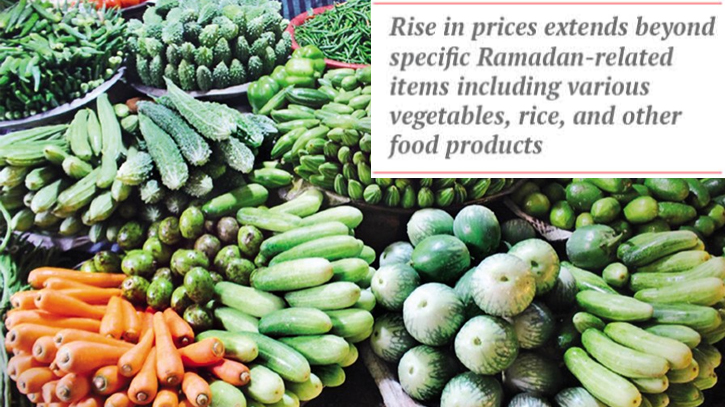
Photo : Messenger
With nearly two months remaining until the start of Ramadan, the prices of essential Ramadan-dependent products have already begun to rise in the market. Key items necessary during fasting, such as gram, dal, edible oil, sugar, ginger, garlic, and onions, are experiencing an increase in prices.
A survey of various markets in the capital on Friday (January 26) revealed these developments. Unscrupulous traders tend to hike prices of Ramadan-dependent products before the month arrives, exploiting the anticipation and demand. There is no genuine need for a further increase in prices during Ramadan, but some traders see an opportunity for extended profits by maintaining elevated prices.
Notably, the rise in prices extends beyond specific Ramadan-related items to include various vegetables, rice, and other food products. Following the elections, rice prices surged by Tk 6 per kilogram, and though some shops have witnessed a decrease of 2 to 3 taka, most are still selling at previous prices.
Despite government interventions such as raids in the rice market, price regulations on certain commodities, and expectations of increased vegetable supplies, relief is not yet apparent in the market. The abnormal increase in rice prices at the beginning of the year has been unexpected for buyers.
Post-election, rice prices per bag increased by Tk 400 to Tk 500. Subsequent government interventions led to a decrease of Tk 200 to Tk 300 per sack in the wholesale market. However, this impact has not trickled down to the retail market, and consumers are still grappling with increased rice prices.
According to rice seller Nazim, prices for all types of rice have decreased by one to three taka per kilogram. However, buyers argue that the rate of increase in rice prices following the 12th national parliament election has not shown signs of abating.
In the market, Nazirshail rice is being sold at Tk 60 per kilogram, twenty-eight rice at Tk 55 per kilogram, and Pajam coarse rice at Tk 54 to Tk 55 per kilogram. Processed miniket rice is being sold at Tk 72 to Tk 75 per kilogram.
The market is witnessing a surge in vegetable prices, with almost no vegetable available below Tk 80, except for papaya at Tk 50 and radish at Tk 40. The cost of garlic has risen from Tk 20 to Tk 40, while ginger has increased from Tk 10 to Tk 30, selling at Tk 260 to Tk 280 per kg. Furthermore, onions, previously priced at Tk 80, are now being sold at Tk 90 to Tk 100 per kg, maintaining a higher rate compared to the same period last year.
Among the volatile Ramadan products, chickpeas have seen an increase from Tk 100 to Tk 110 per kg, compared to Tk 75 to Tk 80 per kg last year. Similarly, lentils have risen by Tk 10 per kg, small grain lentils are being sold at Tk 140 to Tk 150, and good quality mung dal has reached Tk 160 to Tk 170 per kg, up from Tk 150 a week ago. The price of anchor dal has also experienced an increase.
Farm chicken egg prices have risen again, with a dozen being sold at Tk 140 to Tk 145, up by Tk 10 from the previous week. Bottled edible oil prices increased by Tk 4 per liter last week, and open soybean and palm oil prices are now at Tk 155 to Tk 160 and Tk 130 to Tk 135 per liter, respectively, which is Tk 5 more than the previous week. Additionally, open sugar prices per kg have reached Tk 145 to Tk 150, the highest ever.
In conversations with buyers like Samad in the caravan market, it was noted that businesses are adjusting prices ahead of Ramadan to avoid extending price hikes during the month. Despite government agencies launching market surveillance three months in advance of Ramadan, prices of chickpeas, oil, and pulses have surged. Biplab Sarkar, a grocer in Hatirpool market, highlighted that the prices of various products have reached their maximum levels, with no significant decreases observed.
In the meat market, despite a slight decrease in price for a few days, beef is now being sold at Tk 700 to Tk 750 per kg. Broiler chicken is priced at Tk 200 to Tk 220 per kg, cockerels at Tk 300 to Tk 320 per kg, and domestic chickens at Tk 400 to 500 each. The price of beef has increased, with khasi meat being sold at Tk 1100, reflecting an increase of Tk 50 to Tk 100 per kg.
A visit to the fish market revealed a similar trend, with roe fish above 1 kg priced at Tk 350 to Tk 400, cotton below 1 kg at Tk 300 per kg, and hilsa fish being sold at Tk 1200 to Tk 1500 per kg in 700 villages. Prices of other fish varieties have also risen along with ruhi and hilsa fish.
Messenger/Fameema








